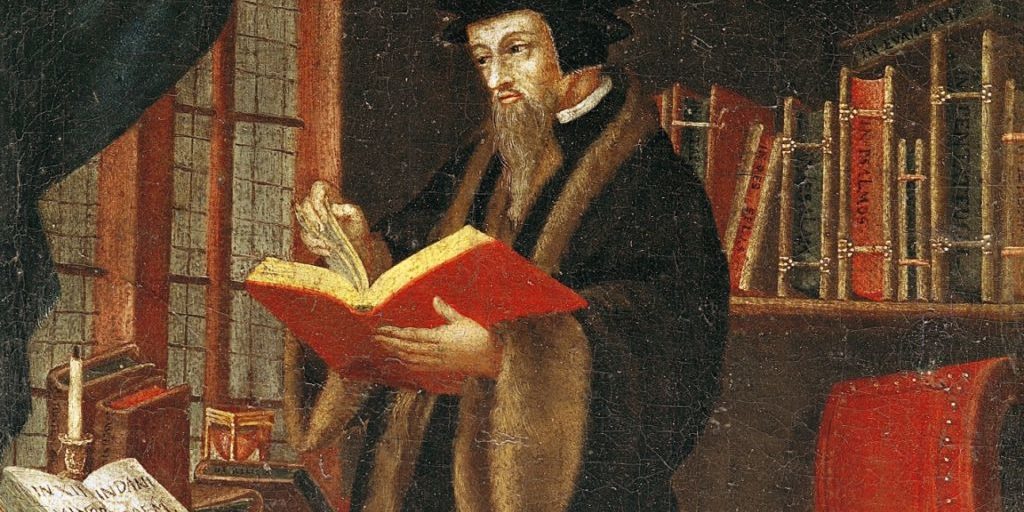
Why Pastors Should Engage John Calvin
When I first discovered Calvinism, I utterly despised it. For years, I fought against Calvinism with all the free will I could muster. Nearly twenty-five years ago, as a student of theology and the original languages, I pored over Scripture, and I read everything I could get my hands on to help me understand what the Bible teaches about God’s sovereignty and man’s responsibility as it pertains to salvation. I knew what Calvinism taught, and I knew what the Bible taught—or so I thought—and I was firmly convinced that Calvinism distorted the biblical teaching about the character and work of our triune God. I was equally convinced that John Calvin was deluded at best and devilish at worst.
But God finally showed me I was dead wrong, and it was hard—very hard. That realization was a crucible for me, and I came to the agonizing conclusion that the teaching of Calvin is in fact the teaching of sacred Scripture, and I could either accept it as such or reject Scripture as the inspired and only infallible rule for faith and life. In the end, I recognized I had no real option. As I cried out to God, “Why have You made it this way?” His humbling reply felt like a slap in the face: “Who are you, O man, to answer back to God?” In the ensuing years, I don’t believe I ever went through what many have termed the period of “cage-stage Calvinism.” That was largely because it was still so hard for me to get comfortable with affirming the doctrines of grace, having fought against them for so long, and I greatly sympathized with those Christians who struggled to grasp those doctrines. I still do sympathize.
Ultimately, it wasn’t Calvin who convinced me of the truth; it was the Holy Spirit and the Word of God that convinced me. And it wasn’t just my understanding of God and salvation that changed; it was my understanding of everything that changed. It was then that I began to have a more charitable heart when engaging with Calvin, not to mention the Reformers, the Puritans, the Reformed confessions of faith, and all our faithful forefathers of the past. Through my remaining years of undergraduate study in Bible and theology and through my years in seminary, I began to more thoroughly engage with Calvin, and I found that by engaging with Calvin I began to engage with Scripture in a more careful and thorough way.
When I became a pastor, I studied Calvin even more, and I have found that Calvin has served me in more ways than I could have imagined, and in turn, he has served our congregation as well. In reflecting on the manifold ways God has used Calvin to shape my life and ministry, I propose the following few thoughts on why pastors should engage with Calvin.
Calvin Sought to Be a Humble Shepherd
Calvin was a pastor first and foremost. He did not strive to be a celebrity pastor or an erudite scholar but sought to be a faithful, ordinary pastor, husband, father, and friend. As a shepherd of God’s flock, he ministered to those who knew him and his family, and in his writing and preaching, his aim was to make things clear and simple, though never simplistic, in order to communicate God’s truth to God’s people in a way they could understand. He was not interested in using sophisticated language to impress scholars and intellectuals. Calvin stated his desire to communicate in a simple way in the introduction to his Institutes of the Christian Religion, where he expressed his hope to help God’s people study the Word of God and have “easy access to it and to advance in it without stumbling.”[1] For us pastors, and for all Christians, we need to pray daily for humility to serve others in a way that is genuinely helpful to them, not in a way that necessarily serves us best. That means we will strive to meet people where they are, to be patient with them, and to communicate with them in ways that serve them, not in a way that attempts to impress them or to make ourselves seem superior or more intelligent.
Calvin Sought to be a Servant of the Word, Not a Master Over It
John Calvin was a student and servant of the Word of God. Calvin saw himself not as a master of Scripture but as a humble student of Scripture, one who strove to understand and teach what God has revealed in His Word and not to go beyond what He has revealed. This may seem like an obvious point, but in the sixteenth century and for centuries prior, that way of doing theology was rare. Calvin’s commitment to Scripture as the inspired Word of God and his aim never to speak where God has not spoken helps us understand why Calvin leaned so heavily on Augustine, whose way of doing theology from the Word of God as the final authority was the basis of Calvin’s method. Accordingly, Calvin did not attempt to develop a system of theology that complemented the Word of God. Rather, he strove to derive his theology from the Word of God for the right worship, enjoyment, and love of God. According to Calvin, we are to be “daily taught in the school of Jesus Christ.”[2] Therefore, according to Calvin, we must be diligent students of Scripture if we are to possess right and sound doctrine: “Now in order that true religion may shine upon us, we ought to hold that it must take its beginning from heavenly doctrine and that no one can even get the slightest taste of right and sound doctrine unless he be a pupil of Scripture.”[3] Elsewhere, Calvin writes, “Let us not take it into our heads either to seek out God anywhere else than in his Sacred Word, or to think anything of him that is not prompted by his Word, or to speak anything that is not taken from that Word.”[4] This, T. H. L. Parker writes, “is Calvin’s theological programme—to build on the Scripture alone.”[5] Like Calvin, we need to strive to be committed to the Word of God, not just with lip-service but authentically and with all our hearts. Too many pastors are attempting to build their ministries and promote themselves with their own ideas and opinions rather than the Word of God. Calvin’s greatness, as B. B. Warfield recognized, was not in his service to himself but in his surrender to God. Click To Tweet
Calvin Sought to Surrender Himself Wholly to God
Calvin was a man who died to himself and sought to take up his cross daily so that he might serve the Lord and the flock that God had entrusted to him. If we are to serve our Lord, our families, and our congregations faithfully, that is precisely what we as pastors need to do every day of our lives as we throw ourselves wholly upon the sustaining power of the Holy Spirit to preserve us. Because, after all, we don’t belong to ourselves, and our families and our ministries don’t belong to us either. Calvin wrote:
If we are not our own but the Lord’s, it’s clear what errors we must flee, and what we must direct our whole lives toward. We are not our own; therefore, neither our reason nor our will should dominate our plans and actions. We are not our own; therefore, let us not make the gratification of our flesh our end. We are not our own; therefore, as much as possible, let us forget ourselves and our own interests.
Rather, we are God’s. Therefore, let us live and die to Him. We are God’s. Therefore, let His wisdom and His will govern all our actions. We are God’s. Therefore, let us—in every way in all our lives—run to Him as our only proper end. How far has he progressed who’s been taught that he is not his own—who’s taken rule and dominion away from his own reason and entrusted them to God. For the plague of submitting to our own rule leads us straight to ruin, but the surest way to safety is neither to know nor to want anything on our own, but simply to follow the leading of the Lord.[6]
Calvin’s greatness, as B. B. Warfield recognized, was not in his service to himself but in his surrender to God: “Here we have the secret of Calvin’s greatness and the source of his strength unveiled to us. No man ever had a profounder sense of God than he; no man ever more unreservedly surrendered himself to the Divine direction.”[7]
Pastors would do well to engage with Calvin not because Calvin was so great in himself but because he sought to surrender himself to God in all his motives, thoughts, and actions, for God’s glory and not his own. That is our vocation—surrender to God. As shepherds of God’s flock, as students and servants of the Word, and as those who have died to self, let us sincerely pray that God might use us to accomplish His mission of saving and discipling the nations for His glory, not our own, and all by His sovereign and amazing grace.
Endnotes
[1] John Calvin, Institutes of the Christian Religion, ed. John T. McNeill, trans. Ford Lewis Battles, Library of Christian Classics XX–XXI (Philadelphia: Westminster,
1960), Introduction, 4.
[2] Letters of John Calvin, ed. Jules Bonnet, 4 vols. (Eugene, Ore.: Wipf & Stock, 2007), July 20, 1558.
[3] Calvin, Institutes of the Christian Religion, 1.6.2.
[4] Calvin,Institutes of the Christian Religion, 1.13.21.
[5] T. H. L. Parker, Portrait of Calvin (Philadelphia: Westminster, 1954), 52.
[6] John Calvin, A Little Book on the Christian Life, trans. and eds. Aaron C. Denlinger and Burk Parsons (Orlando, Fla.: Reformation Trust, 2017), 22–23.
[7] B. B. Warfield, Calvin and Calvinism (1932; repr., Grand Rapids, Mich.: Baker, 2000), 24.

